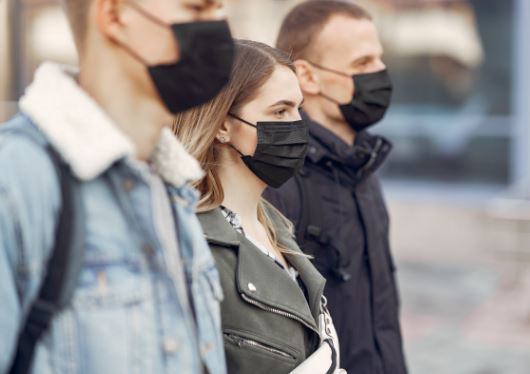by Becky Andrus | Oct 6, 2020 | Uncategorized

Governor Whitmer Releases Video Urging Michiganders to Wear a Mask and Practice Social Distancing to Keep Schools and Businesses Open and Protect Frontline Workers
LANSING, Mich. — Today, Governor Gretchen Whitmer released a video on social media urging Michiganders, the legislature, the president, and Congress to do their part to protect families, frontline workers, and small businesses from the COVID-19 pandemic.
“For the past seven months, I’ve been making the tough decisions that took us from the state with the 3rd highest cases of COVID-19 per million in March and April, to the 33rd highest in September. We have one of the best economic recoveries in the nation too. Studies concluded we saved thousands of lives,” said Governor Whitmer. “But after the Republican Legislature sued to take away my executive authority, this past Friday the Michigan Supreme Court struck down the statute under which I issued executive orders to save lives and protect Michigan families, frontline workers, and small businesses.
“As a result of the Court and the legislature’s action, our COVID-19 cases will very likely go up. There will be uncertainty, disruption, and possibly greater risk to our economy, more people quarantined, and more deaths.
“The ruling does not mean that the orders I issued violated the law. Although I disagree with the conclusion, the Court held the law is unconstitutional, meaning the legislature did not have power to pass the law in 1945. In fact, the Court made clear that I interpreted the 1945 law correctly. And the ruling does not mean all of the protections we have put in place will go away. I have additional powers that I will use to protect our families from the spread of this virus.”
Today, Michigan Department of Health and Human Services Director Robert Gordon issued an Emergency Order under MCL 333.2253 restricting gathering sizes and requiring face coverings in public spaces. Under MCL 333.2253, if the MDHHS director determines that control of an epidemic is necessary to protect the public health, the director by emergency order may prohibit the gathering of people for any purpose and may establish procedures to be followed during the epidemic to insure continuation of essential public health services and enforcement of health laws.
“The CDC and public health experts agree that wearing masks and practicing safe physical distancing are crucial to slow the spread of the virus, protect our frontline workers, and keep our schools and small businesses open,” said Governor Whitmer. “Michiganders, here’s what we need you to do: please take this virus seriously by wearing a mask when you go out, washing hands, and maintaining six feet of physical distance. Get a flu shot. Taking this action is essential to keeping our small businesses and schools open. COVID 19 didn’t stop being a threat because the court ruling, or because we’ve tired of it, or because the legislature left town.
“Let us not squander the sacrifice we have made to get to this point. We all have to do our part. You can protect the brave men and women on the front lines who are working every day to keep us safe. The health care workers and first responders, grocery store employees, child care workers, and all of the people who have been putting their lives on the line since day one.”

by Becky Andrus | Oct 6, 2020 | Uncategorized
|
FOR IMMEDIATE RELEASE
Oct. 6, 2019
Nick Assendelft, Public Information Officer, AssendelftN@Michigan.gov, 517-388-3135
Energy Efficiency Day a reminder that small steps can make a big difference
Whether switching out old lightbulbs for efficient LED bulbs at home or retrofitting manufacturing facilities, small steps can lead to big reductions in reducing energy use and utility bills.
Wednesday is national Energy Efficiency Day and the Michigan Department of Environment, Great Lakes, and Energy (EGLE) urges Michiganders to pick up some simple energy efficiency habits that will lead to reduced usage year round, lower utility bills and long-term benefits in coping with climate change.
To mark the fifth annual event (#EEDay2020), Gov. Gretchen Whitmer has issued a proclamation encouraging Michigan residents to embrace energy efficiency habits as the cheapest, quickest and cleanest way to meet consumers’ energy needs and to make homes and workspaces healthier, safer and more comfortable.
Gov. Whitmer has set Michigan on a path toward 100 percent carbon neutrality by 2050 and energy efficiency measures are a large part of achieving that goal. Energy efficiency is a key pillar to combatting climate change.
“Michigan has felt the direct effects of climate change, with communities of color and low-income Michiganders suffering disproportionately. That is why I announced the MI Healthy Climate plan to put Michigan on a path toward 100 percent carbon neutrality by 2050,” Gov. Whitmer said. “In order to achieve that goal we all have to do our part, and energy efficiency measures are easy ways to create a cleaner environment. I hope we all take this day to make a plan on how we can each be more energy efficient and put Michigan on the path to a cleaner, safer and healthier Michigan.”
“Doing a lot of little things can add up to big savings in energy usage for businesses and a healthier lifestyle for residents,” EGLE Director Liesl Clark said. “EGLE’s energy efficiency programs allow small businesses, farms, local governments and school districts to plan for or reduce the cost of retrofitting facilities, which leads to long-term bottom line savings and helps Michigan reach its carbon reduction goals.”
A webinar Wednesday, EGLE’s Energy Efficiency Programs for Communities, will explain how EGLE programs support Michigan communities that are interested in advancing energy efficiency and clean energy for their own facilities or are taking steps to advance clean energy communitywide. Presented by partner Graham Sustainability Institute at the University of Michigan, the webinar will introduce attendees to Energy Services’ staff and goals as well as provide information about the Community Energy Management Program, which makes funding available to local communities.
Future webinars will address The Michigan Energy Code Adoption Process (1-2 p.m. Oct. 15) and Energy Benchmarking for Municipal Facilities (1-2 p.m. Oct. 22).
Energy Services offers grants to facilitate energy related implementation projects, improve energy management, support energy efficiency activities and accelerate the transition to renewable energy for communities, schools, manufacturers and small businesses around the state. Details about the programs and applications can be found on the Funding Opportunities webpage.
Energy efficiencies can also be realized in the transportation sector. Energy Services supports the build-out of a statewide electric vehicle charging network through its Charge Up Michigan Program, while EGLE’s Fuel Transformation Program facilitates the transition to electric and alternative fuel vehicles in the commercial sector.
# # #
|
|
|
|

by Becky Andrus | Oct 6, 2020 | Uncategorized

FOR IMMEDIATE RELEASE
October 6, 2020
October is National Breast Cancer Awareness Month
MDHHS provides tips for early detection, risk reduction
LANSING, Mich. – In Michigan, it is estimated there will be 8,800 new cases of breast cancer and that 1,380 women will die from the disease in 2020. To help continue to raise awareness of this disease, Gov. Gretchen Whitmer has proclaimed October 2020 as Breast Cancer Awareness Month. In an effort to promote early diagnosis and reduce health disparities, the Michigan Department of Health and Human Services (MDHHS) is providing information on what women can do to detect breast cancer early, as well as understand their risks and the lifestyle-related factors that can reduce them.
“Breast cancer has devastated thousands of Michigan families, and during breast cancer awareness month, I am hopeful that Michiganders everywhere will help raise awareness and educate themselves on how to detect breast cancer early,” said Governor Whitmer. “We must also recognize that the mortality rate for breast cancer is nearly 40 percent higher for Black women than white women. Every Michigander, no matter who they are, deserves access to quality, affordable care that will help prevent disparities like this. That’s why I have made a commitment to address health disparities in Michigan, and why I am fighting to protect the Affordable Care Act from Republican attacks.”
“It’s important for women to know their risk for breast cancer and to talk to their health care provider about screening,” said Dr. Joneigh Khaldun, chief medical executive and chief deputy for health at MDHHS. “As women, our risk for breast cancer increases as we get older. Having dense breast tissue, which can mask or hide breast cancer, increases your risk as does having a personal or family history of breast cancer.”
African American women are more likely to be diagnosed at a younger age than white women and diagnosed at a later stage. Compared to white women, African American women also have a higher death rate from breast cancer and across all stages of cancer diagnosis, they have poorer survival rates. Factors that may contribute to this include barriers to early detection and screening, access to clinical trials and the higher likelihood of being diagnosed with a more aggressive form of cancer known as triple-negative cancer.
Getting regular breast cancer screenings and focusing on healthy behaviors can reduce risk, including:
Being tested for breast cancer is important. The U.S. Preventive Services Task Force, the National Comprehensive Cancer Network and the American Cancer Society recommend:
- Women should be able to start screening as early as age 40. Talk to your health care provider about when you should begin screening.
- Women who are more at risk should begin screening at age 40.
- Women with an average risk of breast cancer – most women – should begin yearly mammograms by age 45. All women should begin mammography screening by age 50 at the latest.
- Breast exams, either from a medical provider or self-exams, are no longer recommended.
Women should also know their family history of cancer. Approximately 5 percent to 10 percent of breast cancers are hereditary – meaning breast cancer runs in the family. There are approved medications for women who are identified at an increased risk for developing breast cancer (and not previously diagnosed). These women should discuss the risks and benefits associated with these medications, in addition to possible lifestyle changes, with their health care provider.
If you are uninsured or know someone who needs help paying for mammograms call 844-I-GOT-SCR (844-446-8727) for more information.
To view the proclamation, click the link below:
|
|

by Becky Andrus | Oct 5, 2020 | Uncategorized

Governor Whitmer Urges Michigan Supreme Court to Clarify When Ruling on Emergency Powers Takes Effect
Up to 830,000 Michiganders could lose unemployment benefits if the ruling went into effect immediately
LANSING, Mich. — Today, Governor Gretchen Whitmer and Michigan Department of Health and Human Services (DHHS) Director Robert Gordon filed a motion with the Michigan Supreme Court requesting that they clarify that their October 2nd ruling does not take effect until Friday, October 30th. On October 2nd, a narrow majority of the Supreme Court struck down the statute under which the governor has issued executive orders to save lives and protect Michigan families, frontline workers, and small businesses. If the ruling went into effect immediately, up to 830,000 Michigan workers and their families could lose crucial unemployment benefits. Moreover, critical measures meant to prevent the spread of the COVID-19 virus would also immediately lapse. Ensuring this transition period will allow the governor, local health departments, and the Michigan Legislature to work together to put protections in place that will keep Michiganders safe and protect our economy.
“We need this transition period to protect the 830,000 Michigan workers and families who are depending on unemployment benefits to pay their bills and put food on the table, and to protect Michiganders everywhere who are counting on their leaders to protect them,” said Governor Whitmer. “The Supreme Court has spoken, and while I vehemently disagree with their ruling, I’m ready to work across the aisle with Republicans in the legislature where we can find common ground to slow the spread of the virus and rebuild our economy. It’s time for Republicans in the Legislature to get to work and start showing that they are taking this crisis seriously. They can start by canceling their October recess and getting back to work. Let’s work together and get this done.”
“The Supreme Court’s ruling raises several legal questions that we are still reviewing. While we are moving swiftly, this transition will take time,” said DHHS Director Robert Gordon. “Make no mistake, Governor Whitmer will continue using every tool at her disposal to keep Michigan families, frontline workers, and small businesses safe from this deadly virus. The same is true for our department. We will use every statutory tool available to protect our state employees and the residents we serve. We also need Michiganders to do their part by wearing a mask, maintaining six feet of physical distancing, washing hands frequently, and getting their flu vaccine. We will get through this together.”
“A transition period is critical to ensure protections for the 830,000 unemployed Michigan workers and families who are counting on us. These are men and women who lost their jobs due to COVID-19, and depend on expanded benefits to buy prescriptions and groceries, pay their mortgage, and provide for their families, ” said Department of Labor and Economic Opportunity Director Jeff Donofrio. “During this crucial transition, we will work closely with the governor and leaders everywhere to protect our workers whose jobs were affected by COVID-19.”
Since the first cases of COVID-19 were discovered in Michigan nearly seven months ago, Governor Whitmer has taken swift action to protect Michigan families, frontline workers, and small businesses. The aggressive action she took against this virus has proven to have saved thousands of Michigan lives, and CNN business has routinely ranked Michigan in the top 15 on their list of states that are getting their economies back on track.
After the Supreme Court issued their opinion on Friday, Governor Whitmer vowed to continue working around the clock to fight this virus on behalf of Michigan families. She said, “I want the people of Michigan to know that no matter what happens, I will never stop fighting to keep you and your families safe from this deadly virus.”
To view the motions filed today, click the links below:

by Becky Andrus | Oct 5, 2020 | Uncategorized

Statement from Governor Whitmer’s Office on Michigan Supreme Court Ruling
LANSING, Mich. — Today, Governor Whitmer’s office released the following statement from Press Secretary Tiffany Brown following the Michigan’s Supreme Court ruling on Friday.
“When it comes to fighting COVID-19, we are all in this together. The governor is ready to work across the aisle with Republicans in the legislature where we can find common ground, but she won’t let partisan politics get in the way of doing what’s necessary to keep people safe and save lives. The Supreme Court’s ruling raises several legal questions that we are still reviewing. While we are moving swiftly, this transition will take time. As the governor said last week, many of the responsive measures she has put in place to control the spread of the virus will continue under alternative sources of authority that were not at issue in the court’s ruling. We will have more to say on this in the coming days. Make no mistake, Governor Whitmer will continue using every tool at her disposal to keep Michigan families, frontline workers, and small businesses safe from this deadly virus.”
|

by Becky Andrus | Oct 5, 2020 | Uncategorized
Oakland County Health Officer requires masks or face coverings in public
Issues local health order to fill pandemic safety gap following Michigan Supreme Court decision
Pontiac, Mich. – Oakland County Health Officer Leigh-Anne Stafford has issued local health order 2020-12 to prevent the spread of COVID-19. The order requires wearing masks or facial coverings when Oakland County residents leave their homes. Additional health orders may be issued in the coming days to cover capacity at restaurants, bars, employee health screenings and other public health concerns.
“Health and science experts agree that facial coverings are critical to controlling the virus,” Oakland County Executive David Coulter said. “We have come too far to backslide now especially as we want to get kids back to school and our economy moving again. In Oakland County masks will continue to be mandatory by order of our health experts. I am confident that our residents and businesses will continue to keep each other safe and protected.”
The Face Covering Order states:
Any individual who leaves their home or place of residence must wear a face covering over their nose and mouth:
- When in any indoor public space; this includes all students in grades kindergarten through twelve; and
- When outdoors and unable to consistently maintain a distance of six feet or more from individuals who are not members of their household; and
- When waiting for or riding on public transportation, while in a taxi or ride-sharing vehicle, school bus or when using a private car service as a means of hired transportation.
- Athletes training for, practicing for, or competing in an organized sport must wear a facial covering (except when swimming) or consistently maintain 6 feet of social distance (except for occasional and fleeting moments).
“Oakland County was hit hard by the COVID-19 and the virus is still in our communities,” said Leigh-Anne Stafford, Oakland County Public Health Officer. “The law provides the tools for a local health officer to protect the public’s health during an epidemic and that is my solemn responsibility. We will work closely with State health officials on additional measures to control the virus.”
Exceptions to the order include individuals who:
- Are younger than five years old, though children two years old and older are strongly encouraged to wear a face covering, pursuant to guidance from the Centers for Disease Control and Prevention (“CDC”)
- Cannot medically tolerate a face covering.
- Are eating or drinking while seated at a food service establishment.
- Are exercising when wearing a face covering would interfere in the activity.
- Are receiving a service for which temporary removal of the face covering is necessary to perform the service.
- Are entering a business or are receiving a service and are asked to temporarily remove a face covering for identification purposes.
- Are communicating with someone who is hearing impaired or otherwise disabled and where the ability to see the mouth is essential to communication.
- Are actively engaged in a public safety role, including but not limited to law enforcement, firefighters, or emergency medical personnel.
- Are officiating at a religious service; or
- Are giving a speech for broadcast or an audience.
- Voters are encouraged but not required to wear a face covering while at a polling place for the purposes of voting in an election.
To view Oakland County’s health orders, go to
www.OakGov.com/COVID and click on the “Health Orders” button. Also, to download a printable sign requiring the wearing of masks or facial coverings, click
here.
Under MCL 333.2453, the epidemic emergency order for local health departments under the Michigan Public Health Code, the local health officer, acting as the administrative agent of the Health Division, can issue fairly broad orders. The statute states, “if a local health officer determines that control of an epidemic is necessary to protect the public health, the local health officer may issue an emergency order to prohibit the gathering of people for any purpose and may establish procedures to be followed by persons . . . during the epidemic to insure continuation of essential public health services and enforcement of health laws.”
Violations of local health orders issued under the Michigan Public Health Code are misdemeanors.








